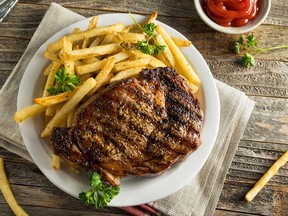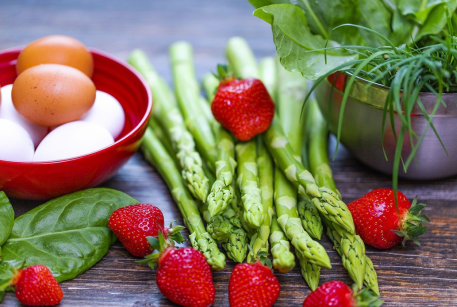You Are What You Eat
 |
"If it's just calories that turn us on, why do we pay so much money for wines from Burgundy, which have no more calories than an $8-bottle of red wine out of some crappy factory?""We;re not just looking for vitamins and minerals just for their own sake -- hoovering them up. But there seems to be some added level of intelligence -- to avoid excesses of one and make sure we get the full spread.""Which seems particularly intelligent, and a particularly efficient way of foraging, if you think about how we would have been in an evolutionary context.""If flavour has some connection to how the brain seeks out or finds value in food in terms of micronutients, we could really be messing things up by adding these things to junk food.""Studies have shown animals use flavour to guide the vitamins and minerals they require. If flavour serves a similar role for humans, we may be imbuing junk foods such as potato chips and fizzy drinks with a false 'sheen' of nutrition by adding flavourings. In other words, the food industry may be turning our nutritional wisdom against us, making us eat food we would normally avoid and thus contributing to the obesity epidemic."Mark Schatzker, writer-in-residence, Modern Diet and Physiology Research Center (affiliated with Yale University)"We hit upon this idea of 'Hang on, if people are showing nutritional intelligence, then maybe that's exposed and expressed in combinations of foods -- the foods that they prefer to pair together.""[While carbohydrates, fat or protein are important] if we only focus on those macronutrients, then I think we arrive at an impoverished understanding of the underlying everyday interaction that we have with food.""In a sense, then you've got a corruption of a system that would have otherwise conferred significant benefit, but now is being adopted perhaps by the food industry to generate foods that are attractive,but hold little nutritional value."Jeff Brunstrom, experimental psychology professor, University of Bristol, England
 |
| “Animals are quite sophisticated,” says Toronto-based author Mark Schatzker. “Cows just don’t mindlessly munch on plants. They’re very picky.” Photo by William West /AFP via Getty Images |
New research published in the journal Appetite, suggests that humans are possessed of "nutritional wisdom", an inborn trait no doubt linked to survival that has the end effect of guiding humans in their navigational search for the "hidden complexity" inherent in the choices we make about the food we prefer to consume. Which leads to the impression that it is food composition, absent the need for calories, that guides our preferences.
Animals "seem to possess a discerning intelligence" in their propensity to select foods based on their micronutrients (vitamins and minerals), and now, according to this new collaboration between two researchers, it would appear that humanity has also been endowed with that inclination. We look not only to fill our stomachs, but to do so with the types of food that our body needs for maximum health, energy and efficiency, as a reflexive action when hunger speaks.
Schatzker's proposition is that mealtime decisions are influenced in part by the need to consume specific micronutrients. The body triggers that autonomous search, sidestepping the mind's awareness of that deliberation. According to Brunstrom there is a belief among scientists that a single factor governs food choice; that could be finding highly calorific foods or sweetness attractive. Their research indicates that the process is found to be more nuanced.
Animals other than human; livestock and rodents for example, select food for their micronutrients, while there is little known about the manner in which human preferences gear to food composition. What does appear is that nutritional intelligence in humans is more complex than it is in other animals. Researchers can tightly control rodent environments and diets, but this kind of experimentation cannot be carried out for human subjects.
The published paper on human nutritional intelligence presents three studies leading to interpretations. In the first, participants selected between images of two pairs of fruits and vegetables all of which vary in their micronutrient composition. "A significant tendency" appeared for people choosing pairings offering both greater amounts of micronutrients and a balance (micronutrient complementarity). A second image-based study followed with different foods, and then a third such study.
 |
In their analysis of a national U.K. nutritional survey of 1,086 people, the researchers saw a similar pattern in two-component meals; the range of micronutrients in steak and fries or curry and rice was wider than might be predicted by chance, for example. People appeared to avoid excess micronutrients as "a form of foraging efficiency". In recent decades alternating focus was placed on low-fat, high-protein and low-carb regimens, with diet culture tending to emphasize macronutrients (carbohydrates, fat and protein).
The collaborative research indicates the manner in which people interact with food is more complicated than macronutrients or calories -- and macronutrients potentially play a role in that complexity. Were humans only involved in meeting macronutrient levels, mixtures of fat and sugar would form a basic diet. And then it seemed to the researchers that human nutritional wisdom could be diminishing, given today's diets rich in processed products so completely at variance from the diets of our evolutionary past.
Today the foods normally consumed may have the hallmarks of nutritional value, but the sensory clues humans are dependent on are in actual fact, the product of artificial flavourings and colourings. Flavour, as Schatzker points out is used by the body's outreach as a guide to nutrition. The multi-billion food-flavour industry places additives in a wide range of food products that we familiarly identify as convenience foods and food 'junk'.
 |
| The research findings were published in the journal 'Appetite' by Jeff Brunstrom who is the lead author and Professor of Experimental Psychology and Mark Schatzker at the University of Bristol. |
Labels: Human sensory nutritional choices, Macronutrients, Micronutrients, Processed Foods Diminished Nutrient Choices, Research, whole Foods

0 Comments:
Post a Comment
<< Home